An another branch of crypto regulation: alternative solutions

According to the threat of new cryptocurrency regulations, one of the biggest decentralized exchanges Uniswap stopped trading certain tokens.
However, the main fear and stress in the cryptocurrency world are about the first version of tax compliance requirements proposed by the United States Senate.
Current crypto-related policies and regulations fall into three main directions:
- The first direction is that the infrastructure bill is going to enhance revenue and allow the Internal Revenue Service to charge taxes;
- The second direction is intended to enable secured markets for investors. The U.S. Securities Exchange Act provides the Securities and Exchange Commission with a right to regulate securities markets and the Commodities Exchange Act to control derivatives markets.
- The third direction is intended to control AML and CFT problems. For instance, according to the U.S. Bank Secrecy Act, financial companies need to incorporate AML/CFT programs into their businesses, including KYC services.
FATF, an intergovernmental organization, designed these standards. Its primary mission is to solve AML and CFT issues. These regulations are implemented to protect transactions against terrorist attacks, human and drug trafficking and make the cryptocurrency sector safe and pure. All the AML policy is intended to prevent cryptocurrencies from being used in the dark market.
Current issues in the decentralized infrastructure
A lot of DeFi developers are confident that AML/CFT regulations don’t apply to them. For instance, a leading decentralized crypto exchange states that it doesn’t meet AML/CFT requirements since it doesn’t control assets within its protocol; it’s a software development studio.
So that, this reaction of the decentralized exchange causes the following question: who is liable if DeFi developers aren’t liable. An answer to this question may be liquidity providers (LPs). While crypto-native LPs try to avoid their responsibility, traditional institutions need to understand that they ensure the circulation of illegal transactions before allocating assets on behalf of their investors. Institutional capital needs to enable the next stage of the development of DeFi. Therefore, the DeFi community needs to offer a high-quality solution to regulators and traditional banks to avoid their control.
On the other hand, laws change very often. When it comes to national security, governments pass laws very quickly while avoiding bureaucratic red tape. DeFi is considered a threat to the traditional financial system because of its independence from fiat money and impossibility to be controlled by regulators and authorities completely. In the future, cryptocurrencies can replace all the traditional financial systems and become a single way to purchase products and services. That’s why regulators and authorities try to hinder the development of the decentralized system by implementing diverse regulations, including KYC verification, and others. The development of DeFi has a positive impact on the development of the financial system overall. However, it has negative consequences since huge amounts of cryptocurrencies are used in money laundering, including extortion, scamming, phishing and hacking attacks, purchasing illegal products and services, etc. For instance, around $ 4, 4 million BTC was paid by Colonial Pipeline to stop a ransomware attack.
Thirdly, the essential purpose of DeFi is to build transparent, safe, and decentralized infrastructure, joining users around the world. This mission is intended to prevent the involvement of cryptocurrencies in illegal activities related to the black markets, terrorism financing, and much more.
An alternative solution
Since the implementation of the KYC procedure contravenes the main principle of DeFi and provides third parties and regulators with access to all the private information of decentralized exchanges’ customers. It allows regulators and authorities to control infrastructure that was initially designed as a decentralized system.
Therefore, crypto enthusiasts have designed an alternative solution that protects users of cryptocurrencies against money laundering. This solution is cryptocurrency AML software tracking transactions and checking them on the involvement in the “dark market”. This AMl software can be used by single users, holders, traders, investors, and whole companies, and decentralized exchanges.
By using AML software, decentralized exchanges will protect their honest customers against scammers, thieves, hackers, and other fraud and provide them with a high level of security. There are different AML services providing their users with a possibility to check transactions on “purity”, including Coinfirm, Chainalysis, Elliptic, CipherTrace, ScoreChain, AMLBot, and others. One of the most reliable AML-software is AMLBot, which allows users to trace many transactions due to the API integration. Any decentralized exchange can implement this AML-software and track transactions before crypto funds come to the platform.
AMLBot service offers many benefits, including free first check, affordable prices, a user-friendly interface, easy registration, a high level of security, a detailed report about addresses, a wide assortment of cryptocurrencies to check, and high-quality support.
In conclusion, today, one of the main issues in the cryptocurrency world is the implementation of KYC verification services by exchanges. On the one hand, this is a great solution protecting customers of the exchanges against fraud and money laundering. On the other hand, this procedure contradicts the main principle of cryptocurrencies and decentralized infrastructure. An alternative solution to protect your cryptocurrencies against money laundering and “dirty money” is AML software designed to monitor transactions.